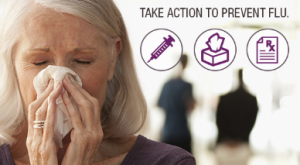By Maridith Yahl
NKyTribune health reporter
Like it or not, flu season underway. Kentucky cases are already being reported and some are in Northern Kentucky reports Lynne Saddler, MD, MPH, District Director of Health, Northern Kentucky Health Department (NKHD).

Dr. Lynne Saddler
Every year during the cold winter months, the flu causes those who catch it to feel down-right terrible. This year, with COVID-19 surging, it is more important than ever to get vaccinated against the flu to protect yourself and others.
NKHD wants to set some facts straight about getting a flu shot and dispel some common myths.
The Center for Disease Control and Prevention (CDC) recommends anyone over the age of six months to get a flu vaccine beginning. If the flu is still spreading, it is not too late to get vaccinated as late as in January. The NKHD says even if it does not prevent the flu, it will decrease the severity of symptoms.
A new vaccine is made every year because the flu, called influenza, is a virus, which means it changes or mutates. This makes it important to get a flu shot yearly, otherwise, you will not be protected.

Each year the World Health Organization (WHO) works with five collaborating research centers around the world to develop a vaccine, in which four strains of the virus are included. The Food & Drug Administration has the final determination of which strains of the virus make up the vaccine in the U.S.
People may be hesitant to get vaccinated because someone has said that they got the flu from getting the flu shot. This is not true nor possible. The flu shot does have a small amount of the dead virus, but it is just that, dead. It cannot cause the flu.
The flu vaccine takes a couple of weeks to become effective or begin protecting your body. That means if you were exposed to the virus just before or during that two-week period you can still contract it.

While most people have no side effects from the vaccine, some do. This may cause some confusion in thinking the shot gave them the flu. Side effects can include aching muscles, headache, and mild fever which go away after a few days. This and the delay in protection could be how the myth began about getting the flu from the flu shot.
The flu is highly contagious. An untruth is that it is just a bad cold. The flu can lead to serious complications including death. For young and elderly alike, the flu is the most common cause of hospitalization, says the NKHD.
During the 2018-2019 flu season, the CDC estimates over 36 million Americans contracted the flu, leading to an estimated 490,000 hospitalizations and 34,000 deaths. The NKHD reports that in Boone, Campbell, and Kenton Counties, 7,235 residents were infected with the flu.
With the COVID-19 pandemic continuing and flu season beginning, the NKHD is worried about the ramifications on the healthcare system. “There is a potential to get peaks of flu and COVID-19 cases at the same time. Even if the flu season is mild, the combined respiratory infections, if there is a COVID surge during flu season, could quickly overwhelm the healthcare system,” says Dr. Saddler.
Besides lowering the possibility of contracting the flu yourself, by getting a flu vaccine you help prevent spreading it to others who are more vulnerable. Imagine having the flu and COVID-19 at the same time. Dr. Saddler says that could make your body extremely sick. It would be asking your body to do a lot of fighting, having both at the same time, she says.
Both the flu and COVID-19 are caused by viruses, causing a contagious respiratory illness. They both have similar symptoms, fever, cough, and aching muscles but there are noted differences.
COVID is more contagious and spreads easier. It also causes more severe symptoms in some. COVID takes longer for those infected to show symptoms and there is a longer contagion period. A main difference between the two is that the flu has a vaccine to prevent it, COVID does not.
Besides getting a flu shot, staying away from those who have the flu will help protect yourself. Continuing hand washing and social distancing are both good practices.
Some think that you cannot spread the flu if you are feeling well. The NKHD says that is not the case. About 20-30% of individuals carrying the virus have no symptoms and spread it to others.
Dr. Saddler says an appointment can be made at each of the county health centers to get a flu shot. If an individual has private insurance, they can get a flu shot at multiple locations including the individual’s health care provider as well as Walgreens, Kroger, and CVS pharmacies.
Contact the NKHD with any questions. Or, Dr. Saddler suggests going to the CDC website where they have an abundant amount of information about the topic.
Maridith Yahl is the NKyTribune’s health reporter
Thanks to Report for America, with support from the Ground Truth Project, St. ELizabeth Healthcare, Foundation for a Healthy Kentucky and the Douglas G. Martin Foundation. You, too, can support this reporting and other NKyTribune reporting with a tax-deductible donation today. Help us continue to provide accurate, up-to-date local news and information you can depend on.



















